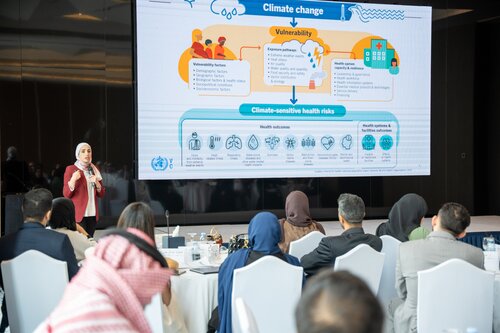UHC2030 hosted its annual UHC Day parliamentarian town hall to...
18 November 2024
A statement from UHC2030's co-chairs at the occasion of COP29 Health Day (18 November 2024)

Climate change is a fundamental threat to human health and an exacerbating factor of existing inequities. As global leaders convene at COP29, we emphasize the need to protect everyone's health from growing climate change threats while ensuring no one is pushed into poverty by out-of-pocket health costs nor foregoes the care they need due to financial barriers.
While no one is safe from climate change-related health risks, people in low-income countries and vulnerable communities everywhere bear the brunt, as they also struggle to afford access to quality health services. Climate change fuels zoonoses and food-, water- and vector-borne diseases, exacerbates mental health issues and health stresses due to extreme weather events. These factors increase the need for health interventions, forcing people to spend more money on healthcare. In 2019, two billion people – almost a quarter of the world's population – suffered from financial hardship due to healthcare costs, and the impacts of climate change are worsening this trend.1 A recent World Bank study estimates that climate change may push “an additional 132 million people (more than half of whom live in Sub-Saharan Africa and South Asia), into extreme poverty by 2030, with 44 million of these driven by health impacts”.2
When climate change-related extreme weather events, such as floods or wildfires, damage healthcare infrastructure, they can cause service disruptions and force patients to travel long distances to access care. Climate change thereby increases treatment costs and causes delays in treatment or the forgoing of essential care, which worsens health outcomes and drives up long-term healthcare expenses.
Additionally, climate change impacts food security, economic opportunities and livelihoods. Rising temperatures, droughts, storms and floods reduce crop yields and damage ecosystems, limiting people's ability to earn a living. As a result, people in low-income settings and vulnerable communities are under even greater pressure to choose between healthcare and other basic necessities, such as food and education, further exacerbating financial insecurity.
It is undeniable that the climate crisis is also a health crisis. The preservation of health and well-being must be central in policy decisions aimed at mitigating or adapting to the effects of climate change. To protect people from the negative health impacts of climate change, it is crucial to achieve universal health coverage (UHC), which means that all people can receive the healthcare they need without suffering financial hardship. UHC ensures that people can afford the health services they need and are protected from impoverishing health payments which they have to make out of their own pockets. UHC is based on the principles of universality, equity and the right to health. It is key to achieving health for all, including the most vulnerable.
As decision-makers meet at COP29, we demand decisive action to safeguard health in the era of climate change. We call on them to:
- Prioritize investments in equitable and climate-resilient health systems, based on a primary healthcare approach, that can deliver health services and care at an affordable cost, maintain service continuity even in times of crisis, and recover swiftly after disaster strikes.
- Expand financial protection through publicly funded health services, ensuring that essential health packages remain accessible even as climate change strains resources.
- Introduce or further expand publicly financed health insurance schemes for all, and ensure that these schemes are also adapted to cover the growing health risks posed by climate change.
By investing in universal health coverage with financial protection, we can address the health threats posed by climate change while ensuring that no one is left or pushed further behind due to impoverishing out-of-pocket health costs. Leaders must act now to stop climate change from exacerbating inequities even further.
We thank Helena Schmitt and Laetitia Bosio for their writing and editing support.
Photo: © WHO
References
- Tracking universal health coverage: 2023 global monitoring report. Geneva: World Health Organization and International Bank for Reconstruction and Development / The World Bank; 2023. Licence: CC BY-NC-SA 3.0 IGO.
- BRIEF, April 5, 2024, Health and Climate Change – World Bank. Accessed on 05/11/2024.
More UHC2030 News
A global health financing emergency threatens progress toward...
UHC2030 at HSR2024: Advancing equity and inclusion in health systems through civil society knowledge
UHC2030, in collaboration with the SUPPORT-SYSTEMS research...
